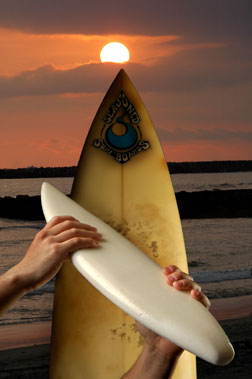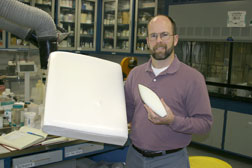NEWS RELEASES
FOR IMMEDIATE RELEASE
February 13, 2006
Sandia researchers develop low-density, environmentally friendly foam that may also be the answer to surf industry crisis
 Sandia National Laboratories photo illustration
shows small version of surfboard blank made from TufFoam.
(Photo illustration by Randy Montoya)
Sandia National Laboratories photo illustration
shows small version of surfboard blank made from TufFoam.
(Photo illustration by Randy Montoya)Download 300dpi JPEG image, “sandia-surf.jpg,” 632K (Media are welcome to download/publish this image with related news stories.)
LIVERMORE, Calif. — Researchers at Sandia National Laboratories in Livermore, Calif., have developed a low-density, energy-absorbing foam that, among other potential applications, could help avoid a complete wipeout for the nation’s $200 million surfboard manufacturing market.
Sandia is a National Nuclear Security Administration (NNSA) laboratory.
TufFoam™ was originally conceived by Sandia materials scientists for NNSA as an encapsulant material to protect sensitive electronic and mechanical structures from harsh weapons environments. It is a water-blown, closed-cell, rigid polyurethane foam that features formulations as low as 2 lbs.-per-cubic foot density. But beyond its use as a structural material, the foam likely has other applications.
“It can be used for thermal and electrical insulation, and as a core material for the automobile and aerospace industries,” said Scott Vaupen, a business associate at Sandia, which is actively pursuing licensing and commercialization partners. “TufFoam™ might not only be ideal for surfboards, but also for car bumpers and airplane wings. The potential market could be staggering.”
 Sandia materials researcher LeRoy Whinnery poses
with two TufFoam™ samples. Originally created for
the National Nuclear Security Administration (NNSA) to protect
sensitive electronic and mechanical structures from harsh
environments, the foam’s properties may be ideally
suited for surfboard blanks and other applications such
as car bumpers and airplane wings.
Sandia materials researcher LeRoy Whinnery poses
with two TufFoam™ samples. Originally created for
the National Nuclear Security Administration (NNSA) to protect
sensitive electronic and mechanical structures from harsh
environments, the foam’s properties may be ideally
suited for surfboard blanks and other applications such
as car bumpers and airplane wings.Download 300dpi JPEG image, “whinnery_2.jpg,” 644K (Media are welcome to download/publish this image with related news stories.)
Clark Foam, the leading manufacturer of foam for surfboard construction, unexpectedly closed its doors late last year because of the impact of ever-tightening environmental regulations on the manufacturing of their polyurethane surfboard blanks. The move has led to near-panic, particularly in California, by manufacturers and sellers of surfboards who fear they will not be able to find the high strength-to-weight ratio surfboard blanks necessary to make the boards. Surf historian Matt Warshaw, in an article in the Santa Barbara NewsPress, said “it’s the equivalent of removing lumber from the housing industry.”
Largely due to its low (2 pcf) density, Sandia’s TufFoam™ might very well fit the bill as a drop-in replacement material. A key feature of TufFoam™ is that it does not contain toluene diisocyanate (TDI), the chemical used in the production of the polyurethane foam surfboard blanks that is most problematic with respect to environment regulations. Another attractive feature of the Sandia product is that all of the chemicals used to make TufFoam™ are commercially available in commodity quantities. The material is currently formulated to be processed in a batch mode, but the processing schedule can be modified for machine mixing or injection molding.
For information regarding possible collaboration towards commercialization or licensing opportunities, contact Scott Vaupen, sbvaupe@sandia.gov, (925) 294-2322.
Sandia is a multiprogram laboratory operated by Sandia Corporation, a Lockheed Martin company, for the U.S. Department of Energy’s National Nuclear Security Administration. Sandia has major R&D responsibilities in national security, energy and environmental technologies, and economic competitiveness.
Sandia media contact: Mike Janes, mejanes@sandia.gov, (925) 294-2447